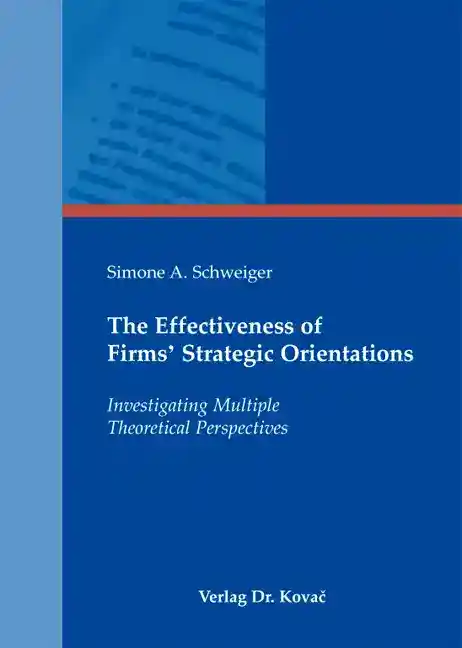Simone A. SchweigerThe Effectiveness of Firms‘ Strategic Orientations
Investigating Multiple Theoretical Perspectives
- in englischer Sprache -
Strategisches Management, volume 153
Hamburg 2013, 202 pages
ISBN 978-3-8300-7301-7 (print) |ISBN 978-3-339-07301-3 (eBook)
About this book deutschenglish
The strategic orientation of firms can take on many forms. Researchers most commonly distinguish between entrepreneurial, market, and learning orientations. In combination, strategic orientations represent a firm’s value proposition in terms of the markets in which it operates, where it deploys its resources, and which behavioral patterns are established. This thesis provides insights into the effectiveness of strategic orientations by adopting multiple theoretical perspectives. The strategic orientations of entrepreneurial, market, learning, and innovation orientations are investigated in an isolated as well as interrelated manner.
The first research article concentrates on entrepreneurial orientation as its conceptualization and operationalization is subject to several debates in the literature. This conceptual study shows how the challenges of the entrepreneurial orientation construct can be overcome in future research to arrive at a higher level of construct clarity. Thereby, the theoretical perspectives of entrepreneurial dominant logic and the theory of planned behavior are employed.
The literature has predominantly focused on investigating the effectiveness of particular strategic orientations. Recently, scholars have stressed their synergetic impact on firm performance and, as such, the relevance of considering their combined role in creating superior value for firms. However, empirical research on their interrelatedness remains scant and dispersed, making it necessary to conduct further research on strategic orientations in an integrative manner. As such, the second research article demonstrates which interrelated roles are played by entrepreneurial, market, and learning orientations in their relationship to firm performance. The rich body of existing knowledge is synthesized by means of meta-analysis under the perspective of strategic coalignment as well as the resource-based view of the firm.
In addition to entrepreneurial, market, and learning orientations, innovation orientation has recently been considered as an important characteristic of an overall strategy. The third research article of this thesis addresses these four strategic orientations and also incorporates an important contextual element: organizational structure, which is likely to influence the relationship between strategic orientations and firm performance. Extant research has not been thoroughly examined how a firm’s strategic orientation and organizational structure are contingent upon each other. Questioning the most effective ‘fit’, this study clarifies which fit perspective is appropriate to understand the contingencies of firms’ strategic orientation and organizational structure in impacting firm performance. Theoretical rationales of this research refer to fit as covariation, moderation, mediation, and profile deviation.
The studies presented in this book enhance our understanding of the effectiveness of particular strategic orientations but also the combined impact of various orientations on firm performance. For each study, implications for managers are provided and avenues for future research are presented.
Keywords
Construct ClarityContingencyCovariationEntrepreneurial OrientationMediationMeta-AnalysisModerationProfile DeviationStrategic Co-AlignmentStrategic FitStrategic OrientationIhr Werk im Verlag Dr. Kovač

Möchten Sie Ihre wissenschaftliche Arbeit publizieren? Erfahren Sie mehr über unsere günstigen Konditionen und unseren Service für Autorinnen und Autoren.
